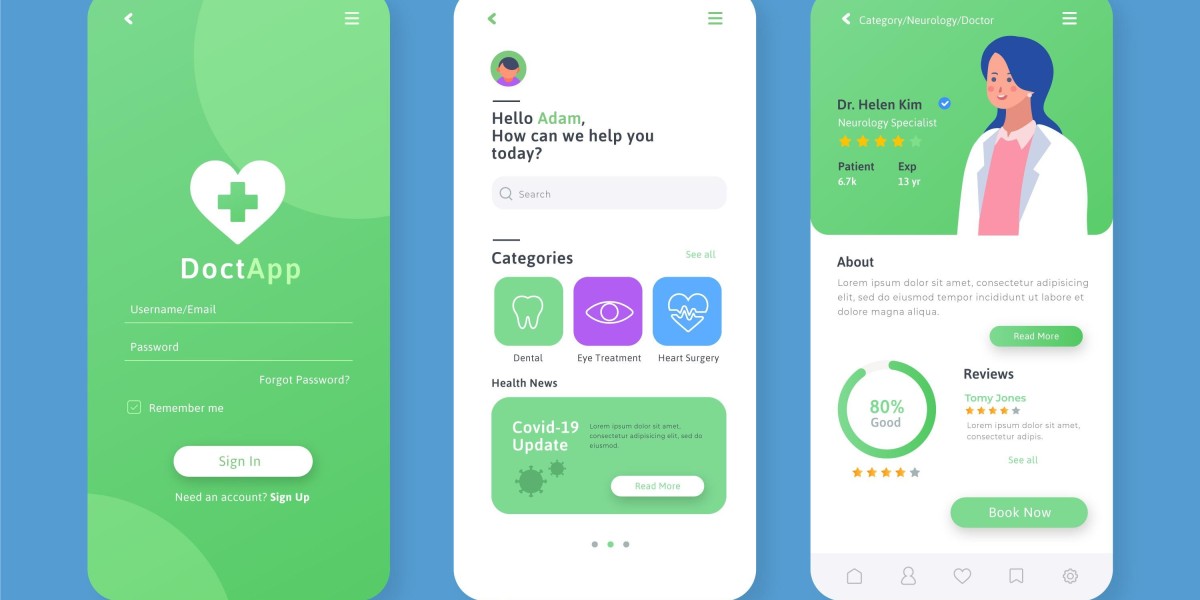In the rapidly evolving landscape of healthcare, the role of technology is becoming increasingly prominent, and at the heart of this technological transformation are healthcare application development companies. These specialized entities play a pivotal role in crafting innovative solutions that enhance patient care, streamline administrative processes, and contribute to the overall efficiency of the healthcare ecosystem. This exploration delves into the world of healthcare application development companies, shedding light on their expertise, the challenges they navigate, and the critical considerations when seeking the right partner in this dynamic field.
The Essence of Healthcare Application Development
Healthcare application development involves the creation of software solutions tailored to meet the unique needs and challenges of the healthcare industry. These applications encompass a wide array of functionalities, ranging from patient management and electronic health records (EHR) to telemedicine platforms and wellness tracking apps. The overarching goal is to leverage technology to improve the delivery of healthcare services, enhance patient outcomes, and optimize the overall healthcare experience.
The Evolving Landscape of Healthcare Technology
The healthcare industry is experiencing a profound transformation driven by technological advancements. Key areas of innovation within healthcare application development include:
1. Telemedicine Solutions:
The rise of telemedicine has been accelerated by healthcare applications that facilitate remote consultations, virtual visits, and real-time communication between healthcare providers and patients. These solutions have become especially crucial in ensuring continuity of care, particularly during times of global challenges.
2. Electronic Health Records (EHR) Systems:
EHR systems have revolutionized the way healthcare professionals manage patient information. Healthcare application development companies are at the forefront of creating secure, interoperable, and user-friendly EHR solutions that centralize patient data, streamline workflows, and enhance collaboration among healthcare teams.
3. Wellness and Fitness Apps:
The emphasis on preventive healthcare has led to the development of wellness and fitness applications. These apps empower users to track their physical activity, monitor vital signs, and adopt healthier lifestyles. Healthcare application developers integrate features that promote overall well-being and encourage proactive health management.
4. Health Monitoring Devices Integration:
The integration of healthcare applications with wearable devices and health monitoring tools is on the rise. Developers create seamless connections, allowing data from wearables to be incorporated into the healthcare ecosystem. This data-driven approach enables personalized healthcare interventions and remote monitoring.
5. Medication Management Apps:
Healthcare application development extends to medication management solutions. These apps assist patients in adhering to their medication schedules, providing reminders, dosage tracking, and educational resources. Medication management applications contribute to improved treatment adherence and better health outcomes.
The Role of Healthcare Application Development Companies
The expertise of healthcare application development companies is multidimensional, encompassing technical proficiency, domain knowledge, and a commitment to addressing the unique challenges of the healthcare sector. Here are key aspects of their role:
1. Understanding Healthcare Workflows:
Healthcare application development companies immerse themselves in the intricacies of healthcare workflows. They collaborate with healthcare professionals to gain insights into clinical processes, administrative tasks, and patient interactions. This understanding is crucial for creating solutions that seamlessly integrate with existing healthcare systems.
2. Security and Compliance:
The sensitive nature of healthcare data necessitates a strong focus on security. Healthcare application developers implement robust security measures to protect patient information, ensuring compliance with healthcare regulations such as the Health Insurance Portability and Accountability Act (HIPAA) in the United States.
3. User-Centric Design:
Creating applications that prioritize user experience is paramount. Healthcare application development companies employ user-centric design principles to ensure that their solutions are intuitive, easy to navigate, and conducive to positive user interactions. This is particularly significant in healthcare, where usability directly impacts the effectiveness of the application.
4. Interoperability with Existing Systems:
Seamless integration with existing healthcare systems is a critical consideration. Healthcare applications need to exchange data with electronic health records, laboratory information systems, and other healthcare databases. Development companies ensure interoperability to facilitate cohesive and efficient healthcare delivery.
5. Mobile and Cross-Platform Development:
Given the prevalence of mobile devices, healthcare applications are often designed for various platforms. Development companies specialize in mobile and cross-platform development to reach a broad user base. This includes creating applications for both iOS and Android platforms and ensuring a consistent user experience across devices.
6. Incorporating Emerging Technologies:
Healthcare application developers stay abreast of emerging technologies such as artificial intelligence (AI) and machine learning. These technologies are leveraged to enhance diagnostics, personalize treatment plans, and automate repetitive tasks, contributing to more efficient and advanced healthcare services.
7. Continuous Testing and Quality Assurance:
Rigorous testing is a hallmark of healthcare application development. Companies conduct extensive testing and quality assurance processes to identify and rectify potential issues. This ensures the reliability, accuracy, and security of the application before it is deployed for use.
Leading Healthcare Application Development Companies
Several companies stand out for their expertise in healthcare application development. These entities have demonstrated a commitment to innovation, security, and the creation of solutions that positively impact the healthcare industry. Here are some notable players:
1. ELEKS:
ELEKS is a global software development company with a focus on healthcare application development. The company's portfolio includes telemedicine solutions, EHR systems, and mobile health applications. ELEKS is known for its emphasis on user experience and its ability to address complex healthcare challenges through technology.
2. ScienceSoft:
ScienceSoft specializes in healthcare IT solutions, offering a range of services including healthcare application development. The company has experience in creating applications for patient engagement, telehealth, and healthcare analytics. ScienceSoft's solutions are characterized by their adherence to regulatory requirements and data security standards.
3. Cleveroad:
Cleveroad is a healthcare application development company that provides end-to-end solutions for healthcare providers and startups. The company's expertise spans mHealth apps, medical software, and healthcare analytics platforms. Cleveroad is recognized for its innovative approach and commitment to delivering impactful healthcare solutions.
4. MobiDev:
MobiDev is a software development company with a dedicated healthcare practice. The company offers services in healthcare software development, including applications for patient management, diagnostics, and remote monitoring. MobiDev's focus on leveraging technology for healthcare transformation positions it as a key player in the industry.
5. Iflexion:
Iflexion is a custom software development company with a comprehensive healthcare portfolio. The company's healthcare applications cover areas such as medical records management, telemedicine, and health information exchange. Iflexion's commitment to creating scalable and secure healthcare solutions has earned it recognition in the industry.
Future Trends in Healthcare Application Development
The future of healthcare application development is shaped by ongoing advancements in technology and evolving healthcare needs. Several trends are likely to influence the trajectory of healthcare applications:
1. Artificial Intelligence in Diagnostics:
The integration of AI for diagnostic purposes is expected to become more prevalent. AI algorithms can analyze medical imaging, pathology data, and patient records to assist healthcare professionals in accurate and timely diagnostics.
2. IoT-Enabled Healthcare:
The Internet of Things (IoT) will play a larger role in healthcare applications. IoT devices, such as wearable health trackers and remote monitoring tools, will continue to generate valuable patient data that can be utilized for preventive care and personalized treatment plans.
3. Blockchain for Health Data Security:
Blockchain technology is gaining traction for its potential to enhance the security and integrity of health data. Healthcare application developers are likely to explore blockchain solutions to ensure the confidentiality and traceability of patient information.
4. Virtual and Augmented Reality in Healthcare Training:
Virtual and augmented reality technologies are poised to transform healthcare training. Healthcare applications may incorporate these technologies to provide immersive training experiences for medical professionals, allowing them to practice procedures in virtual environments.
5. Patient-Generated Health Data (PGHD) Utilization:
Healthcare applications will increasingly leverage PGHD from patient wearables and devices. This data, when integrated into healthcare systems, provides a comprehensive view of a patient's health and lifestyle, enabling more personalized and proactive care.
Choosing the Right Healthcare Application Development Partner
Selecting the right healthcare application development company is a strategic decision that requires careful evaluation. Here are key considerations to guide the decision-making process:
1. Healthcare Expertise:
Choose a development partner with specific expertise in healthcare application development. A deep understanding of healthcare workflows, regulations, and industry standards is essential for creating effective and compliant solutions.
2. Regulatory Compliance:
Ensure that the development company has a proven track record of developing healthcare applications that comply with relevant regulations, such as HIPAA, GDPR, or other regional standards. Compliance is non-negotiable when dealing with sensitive patient information.
3. Security Measures:
Evaluate the security measures implemented by the development company. This includes data encryption, secure authentication processes, and adherence to best practices for protecting healthcare data from breaches and unauthorized access.
4. User-Centric Design:
Prioritize a development partner that emphasizes user-centric design. The success of a healthcare application hinges on its usability and the positive experience it provides to both healthcare professionals and patients.
5. Interoperability Experience:
Assess the company's experience in dealing with interoperability challenges. The ability to seamlessly integrate healthcare applications with existing systems is essential for effective data exchange and collaboration across the healthcare ecosystem.
6. Testing and QA Practices:
Inquire about the company's testing and quality assurance practices. Rigorous testing ensures that the healthcare application functions reliably, accurately, and securely, meeting the highest standards of performance.
7. Client References:
Request client references and testimonials to gain insights into the development company's track record. Positive client experiences and successful project deliveries are indicative of a reliable and trustworthy partner.
8. Communication and Collaboration:
Effective communication is paramount in healthcare application development. Choose a company that prioritizes transparent communication, collaboration, and regular updates to ensure a smooth and successful development process.
Conclusion: Empowering Healthcare through Innovation
Healthcare application development companies stand as catalysts for positive change in the healthcare landscape. The solutions they craft have the power to revolutionize healthcare delivery, improve patient outcomes, and elevate the overall quality of healthcare services. As technology continues to advance, healthcare applications will play an increasingly integral role in shaping the future of healthcare.
In the hands of adept healthcare application developers, technology becomes a conduit for positive change, fostering a healthcare landscape that is not only efficient and effective but also deeply patient-centered. The future holds boundless opportunities for healthcare application development, with advancements in technology, the integration of emerging trends, and a continued commitment to providing accessible and personalized healthcare experiences. The companies at the forefront of this evolution are not merely developers; they are partners in shaping the future of healthcare—one application at a time. In their hands, technology becomes a tool for empowerment, fostering a healthcare ecosystem that prioritizes innovation, efficiency, and, above all, the well-being of patients around the globe.







